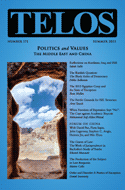“Incidentally, I notice that our professors, trying to show off to their students, rant and rail against the state and against law and order, while expecting that same state to punctually pay their salaries, pensions, and family allowances, so that they value at least this kind of law and order. Make a fist with the left hand and open the right hand receptively—that is how one gets through life.”
—Ernst Jünger, Eumeswil
|
I was invited to speak on this panel, having been reassured that it would be devoted to academic boycotts in general, but I cannot say that I was surprised to discover that half of the titles here advocate one and only one boycott target. I will therefore make some remarks concerning academic boycotts in general, to which I object on principle, but also comment on the campaign against Israeli universities in particular. I expect that we will hear boycott proponents denounce the apartheid character of Israeli society or policies of genocide and other such mythologies that the boycott movement has disseminated and which the APA may eventually be asked to endorse. But let’s leave the propaganda for the discussion section. The National Council of the American Studies Association has voted to endorse a boycott of Israeli academic institutions. That decision is now subject to a ratification vote by the ASA’s membership, which will be completed on Dec. 15. While the ASA website prominently displays support for the boycott, it has to date not given equal play to the many opponents of the boycott within the association. In order to give space to the ASA dissidents and in the interest of academic freedom, Telos publishes the following documents: a communication by former ASA President Shelley Fisher Fishkin to Executive Director John Stephens, of Dec. 8, and a Letter in Opposition to the boycott signed by numerous ASA members, including seven former presidents. |
||||
|
Telos Press Publishing · PO Box 811 · Candor, NY 13743 · Phone: 212-228-6479 Privacy Policy · Data Protection Copyright © 2025 Telos Press Publishing · All Rights Reserved |
||||
 It is this article’s assertion that calls for academic boycott contradict with the classic rationales of the right to free expression and with the peculiar features of the right to academic freedom. Freedom of expression is about developing a dialogue between two opposing opinions, wherein each claims to be the right one. Calls for academic boycott promote monologues rather than dialogues, thus creating the illusion that they represent the truth because they are not challenged. Moreover, protecting the right to academic freedom of individual academics is necessary for their fulfillment as researchers who can respect academic standards exclusively rather than institutional mandates. The self-fulfillment for an individual academic is enacted through the ability to convey messages that can compete against other views.
It is this article’s assertion that calls for academic boycott contradict with the classic rationales of the right to free expression and with the peculiar features of the right to academic freedom. Freedom of expression is about developing a dialogue between two opposing opinions, wherein each claims to be the right one. Calls for academic boycott promote monologues rather than dialogues, thus creating the illusion that they represent the truth because they are not challenged. Moreover, protecting the right to academic freedom of individual academics is necessary for their fulfillment as researchers who can respect academic standards exclusively rather than institutional mandates. The self-fulfillment for an individual academic is enacted through the ability to convey messages that can compete against other views. 

